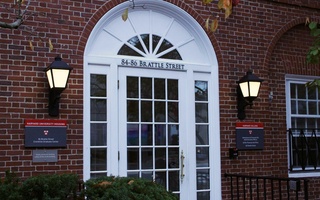{shortcode-e82a4a31148705d7fc3bae2dbc3b352a51cb85ba}Dozens of students gathered Wednesday to discuss a lawsuit challenging Harvard’s affirmative action admissions policy and explore equity in education more broadly.
The event—a collaboration between the Black Students Association, Fuerza Latina, and the Asian American Association—was originally scheduled to take place in the Leverett Library House Theatre, but was moved to the Science Center a few hours before it began due to significant interest.
At the event, the organizations distributed a “fact sheet” about affirmative action at Harvard, which has recently been the subject of intense scrutiny. In Nov. 2014, an anti-affirmative action organization sued Harvard, arguing that its admissions policies discriminate against Asian-American applicants. Earlier this year, the Department of Justice also began investigating whether Harvard discriminates against Asian Americans in its admissions process.
K. Sabeel Rahman, a visiting professor at the Law School, was the event's keynote speaker. In his introduction, Rahman highlighted the debate over affirmative action policies as “just a small slice” of the larger puzzle of diversity in America.
“If we are trying to think about how we make a more inclusive, broader-opportunity society, affirmative action is part of that story,” Rahman said, “But it’s a relatively small part of that story, relative to the scale of the problem.”
The problem, he said, extends far beyond Ivy League admissions. He said that the United States faces many challenges to equity in education and economic mobility. Housing is “in many ways more racially segregated” than it was during the era of Brown v. Board of Education over 60 years ago, Rahman said.
“It turns out empirically that skills-based economic mobility—the idea that getting more training will allow upward economic mobility—turns out to not be empirically true,” Rahman said. “The ZIP Code where you come from turns out to have a multigenerational effect in explaining incomes, two or three generations down the line.”
After Rahman spoke for roughly 15 minutes, organizers turned to the audience, letting students—both undergraduates and students from Harvard’s graduate and professional schools—give their perspectives on the debate.
Gregory K. Davis, a Ph.D. student and resident tutor in Dunster House, mentioned that while some see colleges as “benevolent actors” that provide the “gift” of admission to students, he views the process as a form of capitalism.
“I don’t know what the exchange rate is between a perfect SAT score and just being a black face on campus,” Davis said. “We are giving something to Harvard that other people cannot, and that is important and valuable.”
The lawsuit challenging Harvard’s admissions concluded its fact discovery stage in August, and each side has until next June to file a motion to dispose all or parts of the suit.
—Staff writer William S. Flanagan can be reached at will.flanagan@thecrimson.com. Follow him on Twitter @willflan21.
Read more in News
Bridge Over the River CharlesRecommended Articles
-
Contextualizing Notions of Fairness in College AdmissionsThere is a significant portion of the Asian community who believes that people like me are getting the upper hand in college admissions.
-
 Justice Department Investigation Spurs Student Opposition
Justice Department Investigation Spurs Student Opposition -
Harvard Should Vigorously Defend Affirmative ActionWhile we hope that Harvard complies with its legal obligations in this investigation, we also expect the University to make a compelling case for how affirmative action positively serves the institution.
-
A Room Full of Mirrors: Harvard Without Affirmative ActionWithout diversity, Harvard is, and many colleges would be, a room full of mirrors.
-
 Kavanaugh’s Nomination May Jeopardize Affirmative Action, Experts Say
Kavanaugh’s Nomination May Jeopardize Affirmative Action, Experts Say













